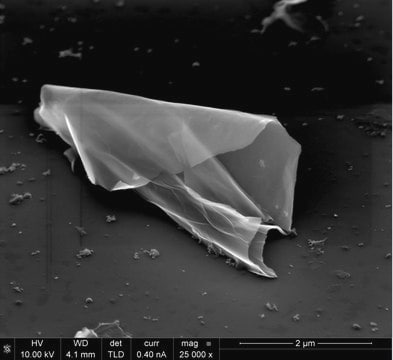900531
Doped graphene
nitrogen/phosphorus co-doped, avg. no. of layers, 1 ‑ 5
Synonym(s):
N/P co-doped graphene, NPG, P/N co-doped graphene, PNG
About This Item
Recommended Products
Product Name
Nitrogen/Phosphorus co-doped graphene, avg. no. of layers, 1 ‑ 5
Assay
≥95%
Quality Level
form
powder
feature
avg. no. of layers 1 ‑ 5
composition
Carbon, 85-95%
Nitrogen, 2.0-4.0%
Oxygen, <7.5%
Phosphorus, 1.0-3.0%
surface area
>500 m2/g , BET
General description
Typical size : 0.5-5 μm.
Application
- Electrocatalyst.
- Field-effect transistors.
- Sensors.
- Lithium ion batteries.
- Supercapacitors.
Storage Class Code
11 - Combustible Solids
WGK
WGK 3
Flash Point(F)
Not applicable
Flash Point(C)
Not applicable
Choose from one of the most recent versions:
Certificates of Analysis (COA)
Don't see the Right Version?
If you require a particular version, you can look up a specific certificate by the Lot or Batch number.
Already Own This Product?
Find documentation for the products that you have recently purchased in the Document Library.
Articles
Advanced technologies for energy conversion and storage aim to improve performance and reduce environmental impact.
Advances in scalable synthesis and processing of two-dimensional materials
Our team of scientists has experience in all areas of research including Life Science, Material Science, Chemical Synthesis, Chromatography, Analytical and many others.
Contact Technical Service



